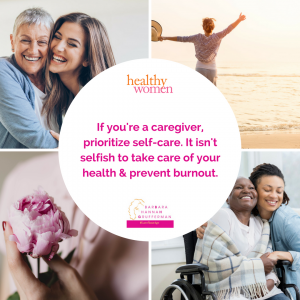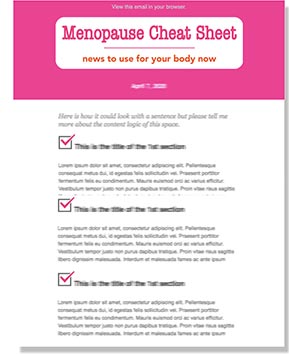Women take care of the world.

While caregiving can be gratifying and meaningful, it can also be physically and emotionally challenging. The key to successfully navigating the often overwhelming role of caregiving while trying to enjoy your own life is to try to put yourself first so you have the energy and stamina to meet every challenge without feeling depleted. As Diane von Furstenberg once told me, “It isn’t selfish. It’s smart.”
To encourage women who care for others (and really, isn’t it just about all of us?) to take better care of themselves, I’ve partnered with HealthyWomen.org, and together, we will share tips and 
Take care of you. You aren’t much good to anyone, including loved ones who need you, if you’re burnt out. Eat well every day, and treat health issues of your own promptly.
Get enough sleep. Find ways to sleep so you feel rested, even if it means hiring overnight help.
Move your body. Exercise will help reduce stress, increase energy, and help you sleep better. Try to get at least 30 minutes of physical activity every day (consider a long walk to clear your head), and be sure to focus on strength-training to keep muscles and bones strong.
Prioritize and delegate. Being a martyr puts you on the fast track to burn out, not happiness. Instead of trying to do it all, make a list, prioritize what’s truly important, and delegate tasks to others, seeking help when needed from the medical community, local nonprofits, community service agencies and other members of your family. Don’t be afraid to ask for help, and don’t be shy about discussing flexible hours with your employer.
Diane von Furstenberg once told me, “It isn’t selfish. It’s smart.”

Don’t hide your feelings: Caregiving can be emotionally overwhelming, creating feelings of fear, anger, and anxiety. If you have a close friend or relative who’s willing to listen, lean on that person. Or, seek the help of a support group, online forum, or therapist.
Stay social. Caregiving can be isolating, but it’s important to prioritize staying connected to other people, especially those who are supportive. Invite friends to walk with you, visit a museum, or see a movie.
Be in the moment. Torturing yourself with thoughts about “would have, could have, should have” will drain you. Wishing things were different will add to your anxiety. Instead, give your 
For over 100 tips and small steps to live a better, longer, happier life, pick up a copy of my newest book . . . or click here to order now!

































































